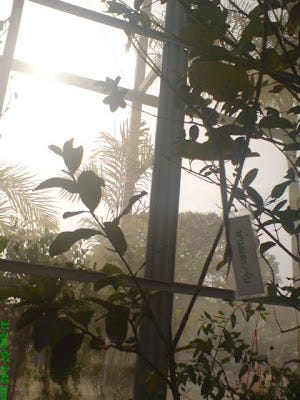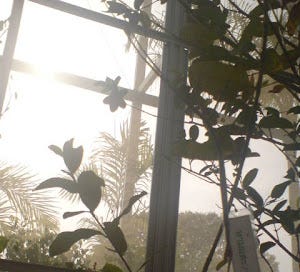
This is a picture from the Bug Exhibition at Chiang Mai on our last full day in Thailand. I'd happily pack up and move over tomorrow. $50,000 will buy you a brand new three bedroom house with spectacular views up and down the Pai Valley. The same amount of money in Sydney gets you a car space in the CBD, literally. That's what they're going for these days; it's so damn hard to find anywhere to park and the anti-progress anti-car ideologues that have blanketted the upper reaches of the public service and the political hierarchy. They're quite happy to make everyone's life miserable, just as long as they can hug to themselves their own greener than green beliefs, their smug conceits, mouthing rubbish about global warming and getting people on to public transport, of building a network of villages within the city; encouraging city life.
Except of course they do nothing of the kind. They don't believe in diversity; if you disagree with them their calm comes unravelled in five seconds flat. They crap on about m-m-m-multiplicity and want a world where everyone sips ginger tea; where the nights are silent, where the ghost of Stalin and the grey of Red Square has seeped right into their boots, where, in short, there is no fun at all.
I was standing on the roof at work last night, talking to a bloke who also goes to Thailand regularly and is married to a Thai, and he had been talking to his wife about Pai because I had told him about it and he didn't know that part of Thailand. I just felt I was in the right place at the right time and I never feel like that, I said. And we laughed.
Nor do I, he said.
Maybe it's the lai lines.
I wouldn't even attempt to describe to my wife what a lai line is.
And we agreed, yes, I know, a lot of people feel like that, but you don't realise until you say it, because people don't talk about it.
And here in Australia the feeling is stronger than just about anywhere, because we're European, and in some fundamental, cosmic sense, we're just not meant to be here.
The feeling's strongest in Sydney, I said. Jan Morris, the travel writer, once James Morris, wrote a book about Sydney, and she wrote about it in that. Sydney has the feeling it could all be washed away in the blink of an eye; a European city thousands of miles from Europe, perched on the edge of a great desert continent, sandwiched on the narrow corridor of green between the land and the sea, and one tidal wave could wash it all away, and the continent would burp, and the city would be gone, and things would be right again. And within a micro-second of geological time the angophoras, with their beautiful curling pink limbs, the cockatoos, screaching their psychedelic, infinite cries, the possoms hiding in the trees, the smoke curling from the fires, the waves slurping against the rocks, it would all come back to a pre-Captain Cook landscape and it would be as if we had never existed, the modern landscape of cars and smoke and factories. Even the colours are all wrong, they just don't fit here.
Perth, he said, is the city where that feeling is the strongest. I remember sitting in a cafe near the water, excellent food, and we're sitting there, and while we're stuffing our faces in comfort at the sidewalk tables, the attempt to be so European, so sophisticated, along the road are these aborigines, completely pissed, derelict, hopeless, living out the destiny we have created for them. We've done so much harm, he said. The hierachy bolder than anywhere eelse, here the clash between the west and the infinite, the millionaires, more per square inch than anywhere else, and they look out on these hopeless people, these street alcoholics, and their worst prejudices are confirmed. He shakes his head, speechless, and we go back to work; working for the man, chained by necessity; both of us months if not years away from our next holiday.
THE BIGGEST STORY:
By Claudia Parsons
BAGHDAD (Reuters) - A car bomb killed 10 people and wounded 21 near a vegetable market in Baghdad on Wednesday, Iraqi police said, as insurgents kept up a campaign of bombings despite a security crackdown backed by U.S. reinforcements.
U.S. President George W. Bush is sending 21,500 extra troops to Iraq, most to Baghdad, where Iraqi and U.S. patrols and security outposts have been stepped up in a bid to halt sectarian violence that was killing hundreds of people a week.
As part of efforts to stabilise Iraq, Foreign Minister Hoshiyar Zebari said on Tuesday officials from regional states including Iran and Syria would join U.S. and British envoys at a meeting in Baghdad next month.
The United States said it would attend, opening the way to a dialogue that critics have long demanded.
In the latest bomb attack on Wednesday, police said a car bomb exploded on a commercial street in the Bayaa neighbourhood of the Iraqi capital, killing 10 people.
Iraqi security force spokesman Brigadier Qassim Moussawi said in the past week 30 militants had been killed and 305 known insurgents detained along with 304 other suspects.
"In general the level of terrorist operations has notably decreased," he told reporters on Wednesday.



